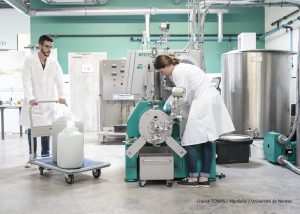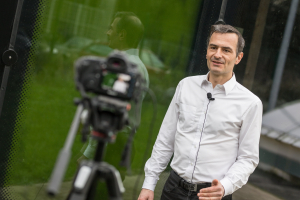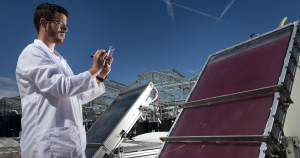Producing high value-added molecules from microalgae
Capacités was entrusted for the implementation of the biorefinery process, as well as scaling it up for routine.

Key words
Linked expertise
Demonstrative-scale production of biomass under solar conditions
Blue Horizon, a specialist in bioengineering, focuses on selecting and cultivating microorganisms essential for closed-loop ecosystems.
The company aimed to provide proof of concept for the use of raw spirulina biomass as a bioplastic for 3D printing. On ESA’s recommendation, Blue Horizon partnered with our microalgae team and utilized the equipment and facilities of the AlgoSolis platform to produce a sufficient quantity of biomass.
The project’s challenge laid in producing a substantial amount of biomass under solar conditions, meaning that light intensity could not be controlled. Our engineers devised a two-step production process tailored to these requirements.
The first production phase involved cultivating spirulina biomass in a 10m² shaded pond to obtain an adequate quantity of biomass.
Then, the spirulina inoculum was transferred to a 35m² pond and exposed to stress conditions under natural day-night cycles which included high light intensity during summer month of July.
The final deliverable met all objectives which included at least 5 kg (dry weight) of spirulina biomass which was lyophilized after harvest to function as one of the raw materials of the recipe. Finally, after subsequent processing steps, the material was successfully used by Blue Horizon for 3D printing and testing, representing a significant step forward for more sustainable plastics manufacturing.
To successfully complete this project, CAPACITÉS leveraged the technical equipment from the AlgoSolis R&D platform (UAR 3722) and received support from the GEPEA laboratory (UMR 6144), joint research unit of Oniris, Nantes Université, IMT Atlantique, and CNRS (French National Centre for Scientific Research).
These projects may also interest you
These projects may also interest you

Capacités was entrusted for the implementation of the biorefinery process, as well as scaling it up for routine.

An interview with the co-founder and CEO of AlgoSource

ezCOL BV called upon experts in bioprocess engineering from Capacités to scale up the microalgal biomass production and provide the volume necessary for a clinical trial.
This site uses cookies and gives you control over what you want to enable